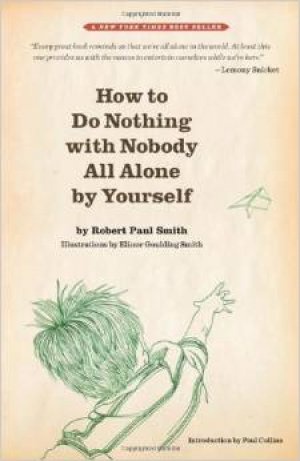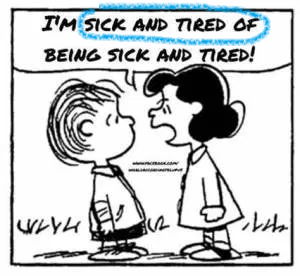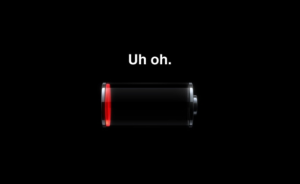Fala aí
Alone or by oneself?

In 1958, a self-described 42-year-old kid named Robert Paul Smith penned a little book titled How to Do Nothing with Nobody All Alone by Yourself (public library), a book of advice on how to make one’s own fun, supplied with nothing more than pencils, blades of grass, handkerchiefs, rubber bands, and broken umbrellas. These are things kids can do by themselves. There are no kits to build these things. There are no classes to learn these things, no teachers to teach them, they don’t need any help from their mother or their father or anybody.
With a wink — perhaps inadvertent — to the existential value of philosophy, Smith writes:
I understand some people get worried about kids who spend a lot of time all alone, by themselves. I do a little worrying about that, but I worry about something else even more; about kids who don’t know how to spend any time all alone, by themselves. It’s something you’re going to be doing a whole lot of, no matter what, for the rest of your lives. And I think it’s a good thing to do; you get to know yourself, and I think that’s the most important thing in the whole world.
Now, alone or by oneself?
That’s a really great question because alone and by oneself are very similar in meaning, but there is one key difference. So, let’s have a look at these words, what they mean, and how you can use them in everyday English. We’ll also look at the idiom, to go it alone.
Here are the example sentences. To get the details of this English lesson, you need to listen to this podcast. And make a careful note of his comments! 😉
- I was home alone.
- I was home by myself.
- Jack lives alone in Brooklyn.
- Jack lives by himself in Brooklyn.
- Jenny will be by herself for the first time when she moves from her parent’s house to her new apartment.
- Jenny will be living alone for the first time when she moves from her parent’s house to her new apartment.
- I fixed my computer by myself.
- I baked this cake by myself. Do you like it?
- I heard that Tommy built a computer by himself. He’s so clever!
- My friend Lauren is good at sewing, and she even made her wedding dress by herself.
- None of my friends wanted to go to the concert so I’m going to go it alone.
- When Jack’s wife told him that she didn’t want to go hiking in the mountains, he decided to go it alone.
- If you don’t want to go on the safari with me, I’m going to go it alone.
Screwed up?
The peak of Covid-19 in SC, Brazil, was initially forecast to mid April. Then it was said that it would be in May. And this week it was announced that it will be in June.
Are we all screwed up?

Phrasal verbs are really common in the English language, and they are a great way to help your English sound much more natural and fluent. Unfortunately they are a little hard to remember when you don’t have an opportunity to learn them in a real life situation. So, I guess this, the COVID-19 pandemic, is a good one!
If you say: I’m screwed!, it means that you’re in a very difficult situation.
So to screw something up, can mean a few different things.
Firstly it generally means to make a mess of, a mistake or completely fail at something, with consequent emotional damage.
I really screwed up at work.
I totally screwed up my relationship with my girlfriend.
When his parents divorced, it really screwed him up.
Tim got fired yesterday because he screwed up with an important client.
I screwed up on a test. (did very badly)
My schedule is completely screwed up.
I can’t believe you screwed that deal up!
To screw up can also mean to ruin something:
I screwed up the dinner. (maybe I put too much salt and it doesn’t taste good)
I screwed up my computer somehow – could you come take a look at it?
It can also mean to confuse something.
Maybe you’re late to a party and someone asks: “Hey, why are you late?” You might say: “Oh, gosh! I screwed up the times!” (confused the times)
And screw up can also mean that you hurt yourself, that is, to injure or damage physically.
If you did a skateboarding trick and you landed badly, you can say: “Oh no! I screwed up my arm!” (hurt your arm)
I screwed up my arm playing tennis.
Now, what do you think? Are we all screwed up because of this pandemic?
Remember, this is a very common and casual expression. So use it in your conversation! 😉
Sick and tired of it?


be sick (and tired) of someone / (doing) something
To have experienced too much of someone or something with the result that you are annoyed:
I’m sick and tired of your excuses.
I am sick of working for other people.
I am sick and tired of listening to your complaints.
I’m sick of him whining about money.
I was sick and tired of wasting my time at long, pointless meetings.
So are you sick and tired of quarantine or containment?

12 Questions Doctors Ask Patients
As we’re living through a pandemic, the COVID-19, an emerging infectious disease, learning about it has urged. We were first introduced to it, by a quick look at the Coronavirus. Then we explored other perspectives: instructions you can give to other people to stay safe, some food for thought, another good message, and a nice song. Now we’re going to learn some general questions doctors ask patients.

To take a medical history, your healthcare providers simply talk to you. Usually they’ll start by reviewing your medical chart and any previous health problems with you. Then they’ll ask you more specifically about your current symptoms, family history, and lifestyle.
Common questions are:
Were you always asked all these questions?
In your opinion, are these questions enough for the doctor to give you the best possible advice?
Do you think that the doctor could be leaving out critical information?
“What’s been going on recently in your life?” Do you think that this could be an important question?
“What changes will you make going forward?” And what about this question?
Tell me what you think.

